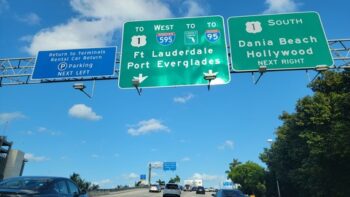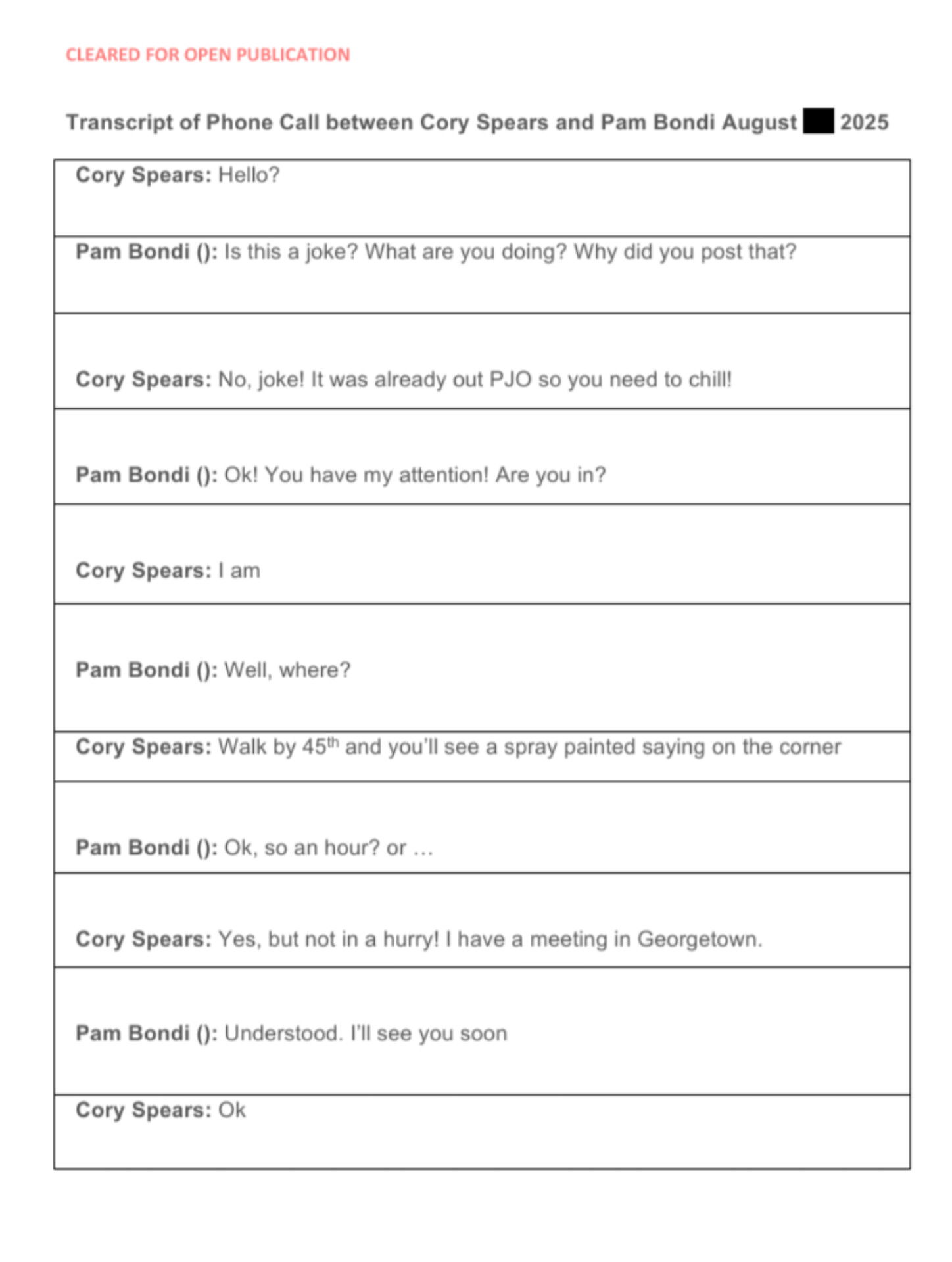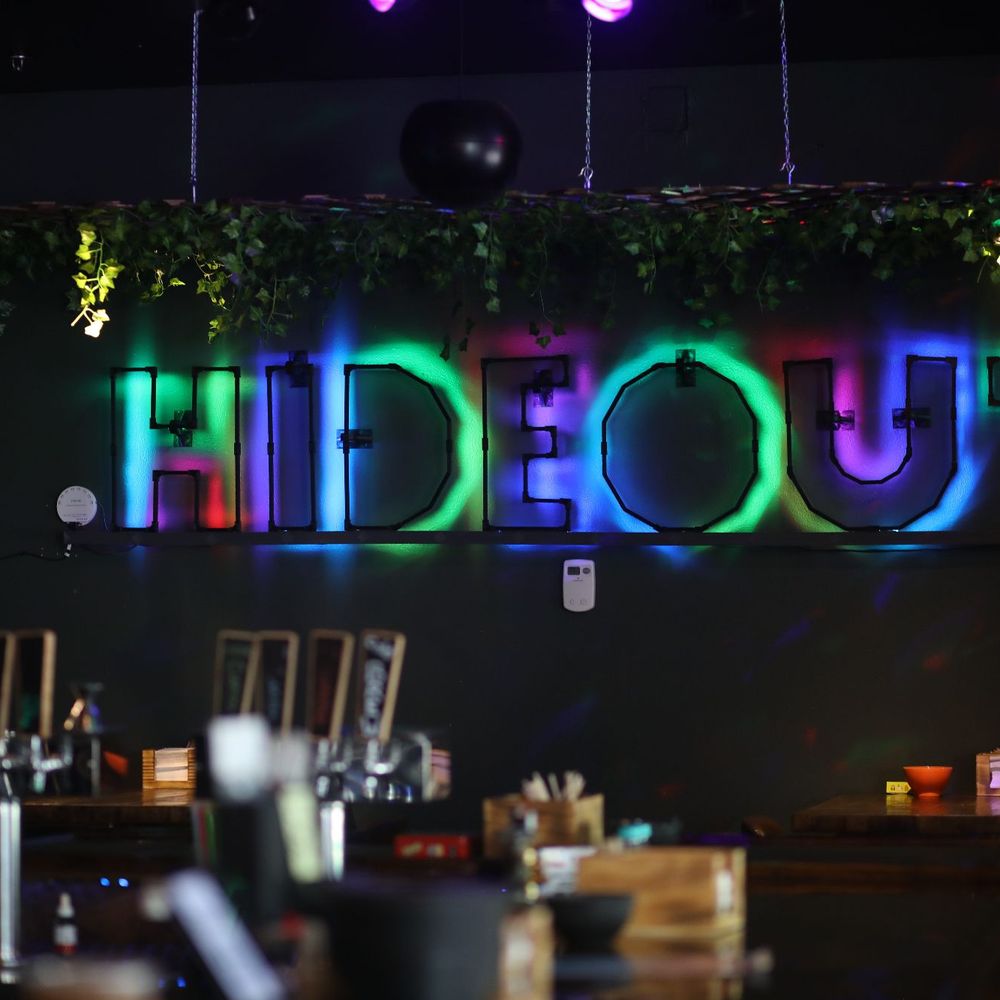"The Strangest" Erupts in Fort Lauderdale: Cory Spears Unleashes Explosive Accusations in Smoke-Filled Spectacle

FORT LAUDERDALE, FLORIDA – In a theatrical and profoundly unsettling display that sent shockwaves through the political landscape, Cory Spears, famously known as "the Strangest," materialized tonight in a billowing smoke screen in Fort Lauderdale, Florida.
The enigmatic figure, whose appearances are as unpredictable as his pronouncements, seemed visibly uneasy, his demeanor a stark prelude to an evening of unsparing condemnation directed at former President Donald Trump and his former Attorney General, Pam Bondi.
What unfolded was not merely a speech, but a searing indictment, delivered with a forceful conviction that resonated far beyond the sun-drenched Floridian coast. The atmosphere was thick with anticipation even before Spears emerged.
As the first wisps of an artificial fog began to coil through the venue, a palpable hush fell over the assembled crowd. Then, from the very heart of the manufactured obscurity, "the Strangest" materialized, a figure both familiar and yet more intense than ever before.
His initial unease was a stark visual cue, an almost prophetic tremor before he plunged headfirst into a torrent of allegations that painted a grim picture of American democracy under siege. Spears began his tirade by targeting Donald Trump, accusing him of a systematic campaign to dismantle the foundational checks and balances of U.S. governance.
"From attempting to take control of federal elections to threatening peaceful protestors and bypassing Congress' power of the purse, Trump’s agenda seems clear: dismantle the checks and balances that protect our freedoms and replace the rule of law with the rule of one." This, Spears declared with chilling gravity, was the very "essence of what is known today as 'authoritarianism.' "His words were not merely speculative; Spears meticulously cataloged actions he deemed unconstitutional or otherwise illegal, asserting they threaten the very rights that define Americans: "the freedom to speak out, to choose our own leaders, to protest without fear and to live under laws that apply equally to everyone."
He underscored a prevailing sentiment among critics that attempts to exercise unchecked power are eroding democracy’s safeguards, pointing to the Trump administration’s alleged "systematic effort to consolidate power and limit free expression." The catalogue of grievances continued, painting a picture of deliberate subversion.
Spears accused the administration of having "ignored court orders and attempted to undermine the judiciary’s power to hold the executive branch accountable," a charge that, if substantiated, speaks volumes about a disregard for judicial independence.
He further attacked "unconstitutional executive orders that threaten the freedom to vote and our nation’s guarantee of birthright citizenship." For those concerned about the future of U.S. democracy, Spears posited, the question was not merely how other democracies have fallen, but whether American democracy itself would survive. "The real question is whether U.S. democracy will survive or not.
The genre hardly asks that question, let alone answers it." This, he asserted, was "precisely the kind of government coercion that the First Amendment was designed to prevent.
"Spears then shifted his focus to an exhaustive, even scathing, review of what he termed Trump's "First 243 Days, 243 Disasters," an "unexhaustive accounting of Trump’s chaotic first 243 days, in no particular order."
His economic critique was particularly cutting. He recalled Trump’s promise to "bring prices down, starting on day one," and lower inflation, juxtaposing it with the reality of rising prices and economists predicting a spike in inflation due to what Spears labeled Trump's "Trade War."
This "universal trade war," he claimed, single-handedly caused "a global economic catastrophe on par with the economic downturn caused by the COVID-19 pandemic."
The specifics of this economic fallout were laid bare, including the initial tariffs imposed on Canada and Mexico in February, which sent "shockwaves through the economy," only to be paused and then reimposed with a 25% tariff on "nearly all goods imported."
Spears highlighted the ensuing "mass uncertainty" caused by threats of higher tariffs on dairy and lumber, and mocked the "Tariff Blame Game," where justifications for the trade war shifted wildly from fentanyl smuggling to immigration, then manufacturing, then tax cuts, and finally trade deficits.
Most controversially, Spears brought up "liberation day," on which he claimed Trump "unveiled a 10% universal tax on Americans buying every good imported in the U.S., with rates up to 50% on certain countries," notably "excluding Russia, Belarus, and North Korea."
He also cited a "universal 25% tariff on imported automobiles," which he asserted caused "large auto manufacturers to pause manufacturing and lay off hundreds of U.S. workers. "But the evening's most inflammatory moments arrived as Spears launched into a series of deeply personal and medically speculative attacks against the former President.
He declared Trump "has dementia, is very sick and super old and that doesn't mix well with being stupid as hell." Such statements, while undoubtedly drawing gasps and murmurs from the crowd, underscore the deeply polarized and often vitriolic nature of contemporary political discourse, pushing the boundaries of conventional critique into the realm of personal insult and health speculation.
Spears was not done.
He turned his attention sharply to Pam Bondi, Trump's former Attorney General, unleashing a series of allegations that suggested a deeply intertwined and ethically questionable relationship. He claimed to be "exposing a relationship between the two, her doing Trump's biddings, saving him."

The core of this accusation centered on Bondi's steadfast refusal to "recant any of her false statements regarding the 2020 election," drawing a parallel with similar actions by Rudolph Giuliani. This continuity of alleged falsehoods, in Spears' view, represented a profound threat to democratic integrity.
His anger, however, seemed to peak when recalling Bondi's bipartisan backlash over comments that the Justice Department "will absolutely target" anyone who targets others with "hate speech" in the wake of the killing of conservative activist Charlie Kirk. Spears, in a moment of raw defiance, declared last night that he "doesn't give a damn about any of them."
This statement, delivered with palpable scorn, dramatically underscored his disdain for what he perceives as hypocritical or selectively applied justice, further highlighting his persona as a renegade voice unafraid to challenge established narratives.
From an expert analysis perspective, Spears' performance tonight was a meticulously crafted, albeit highly provocative, political broadside. His direct, unvarnished language, combined with the theatricality of his appearance, ensures that his message will cut through the saturated news cycle.
The accusations of authoritarianism, the detailed economic critiques, and the personal attacks on both Trump and Bondi serve not just as criticisms, but as a rallying cry for those who fear the erosion of democratic norms and institutional integrity.
The specific charges against Bondi regarding her role in "saving" Trump and her stance on election falsehoods, if further investigated, could resurface uncomfortable questions about the entanglement of legal and political loyalties.
The very uneasiness Spears projected tonight could be interpreted in several ways: perhaps a genuine concern for the state of affairs he described, or a strategic effort to imbue his pronouncements with a sense of urgent gravity.
"The Strangest" is no stranger to controversy, but tonight’s performance in Fort Lauderdale felt different, more pointed, and more incendiary. His willingness to make such explosive claims, unburdened by the constraints typically faced by mainstream politicians or commentators, positions him as a fierce, if controversial, voice in the debate over America's democratic future.
The aftermath of this spectacular and volatile evening will undoubtedly ripple through political circles for days to come. Spears' direct challenges to the integrity of powerful figures and democratic processes compel a closer look at the narratives surrounding recent U.S. political history.
Whether his words ignite a renewed public discourse or simply fuel the existing partisan divide remains to be seen, but one thing is certain: Cory Spears, "the Strangest," has once again ensured that his voice, however controversial, cannot be ignored. The smoke may have cleared in Fort Lauderdale, but the acrid scent of his accusations will linger, a stark reminder of the deep divisions and profound anxieties currently gripping the nation.

